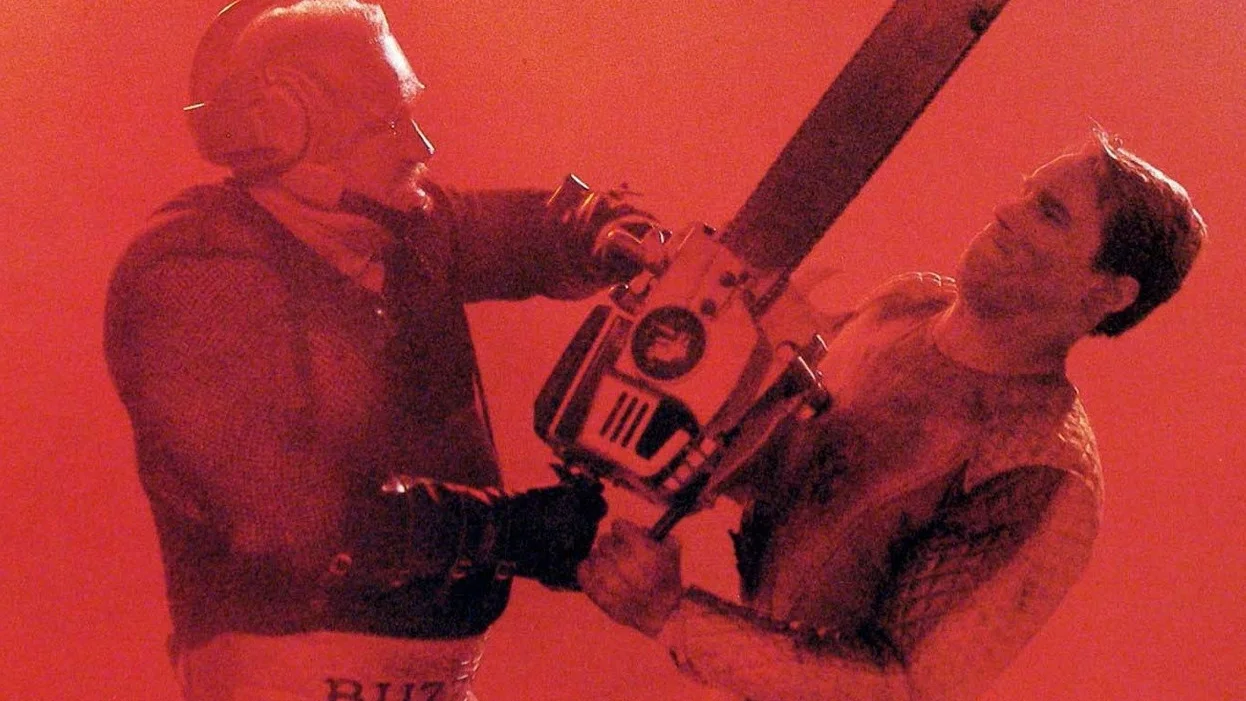The King of Summer: The Running Man (1987)
In the far-flung future of 2017, Ben Richards (Arnold Schwarzenegger) is unjustly imprisoned for the slaughter of peaceful protestors by reactionary, fascist goons in his patrol squad. A dystopian corporate-run society has arisen following an economic collapse and suddenly I don’t feel like this is all that far off from where we are now.
Mounting a prison escape with Laughlin (Yaphet Kotto) and a member of the resistance, Richards goes on the run, but is eventually caught and forced to play the eponymous Running Man game show, hosted by Damon Killian, played by Richard Dawson of Family Feud fame who is essentially satirizing his own public image as an elbow-rubbing glad-hander in front of the camera, and a conniving ratings-obsessed bastard behind the scenes.
The Running Man film goes in a completely different direction than the original Stephen King novel, written under his Richard Bachman pseudonym that allowed him to write sci-fi without the associated “king of horror” baggage. The film has Richards evading themed hunters akin to American Gladiators who’d appear on television years later, in a span of 400 city blocks, according to exposition. The novel plays out more like the “White Bear” episode of Black Mirror, in that Richards goes on the run and is hunted by essentially everyone, though the reasons why are somehow less repulsive in the novel than in the episode; civilians get cash bonuses for tipping off hunters and law enforcement to the whereabouts of any Runners in the game—why that’s less repulsive than the episode of Black Mirror, I’ll leave for you to watch and find out. In the Running Man film, however, civilians only make wagers to distract from their dystopian lives, their most direct involvement being studio audience members choosing which Hunters to loose upon the game area and when.
Those Hunters are some of the strongest parts of the film, too. Toru Tanaka, professional wrestler and bit player in Pee-Wee’s Big Adventure and Alligator II: The Mutation, plays hockey themed Hunter Sub-Zero. Jim Brown, professional football player and legendary character actor from The Dirty Dozen, Ice Station Zebra, Three the Hard Way, plays jetpack and flamethrower-toting Hunter Fireball. And finally, former Minnesota governor, professional wrestler and '80s power pop… single releaser Jesse Ventura rounds out the Hunters as “The Frank Gifford of Running Man” Captain Freedom.
Schwarzenegger tears his way through the game area’s 400 city blocks, losing supporting cast members along the way (bye Yaphet). And he always manages to toss out a Moore-era Bond-level pun when he eliminates a threat. His best line in the whole film, however, is when he has a face-off with Richard Dawson’s Killian.
And a thousand early-2000s soundboards for prank calls were born.
Really, Running Man, the film, bears very little resemblance to the novel, which is more akin to the Canadian thriller Series 7: The Contenders. Richards as a character isn’t even comparable to Schwarzenegger, with King himself later describing his lead character as slight and “pre-tubercular.” Neither descriptor fits Schwarzenegger in the least, and those details can inform just how off-book the film goes.
King’s Richards, in the book, got paid for every hour he stayed alive, with bonuses for kills on police and Hunters. And if he were to make it to 30 days on the run without being killed, he’d win a grand prize of $1 billion dollars in 1982 money. That Richards in the novel breaks the game’s record of 8 days, 5 hours is a testament to just how much more brutal the source story is.
Now, with the police killing on its own, this film would likely not get made as originally written by King. That the novel ends with Richards flying a plane into the network’s office building to take himself and Killian out (35-year-old spoiler alert) only hammers that home in a post-9/11 United States. These details however are more reflective of the desperate level of society in King’s story. Richards is blackballed from his trade in the novel, desperate to provide for an ailing wife and child. A permanent underclass battles for corporations’ scraps, motivating them to rat out Runners in the game.
The 1987 film does demonstrate just how desperate its underclass has gotten, but it’s far more of a background detail by virtue of Richards himself being a disgraced police officer in the story. Schwarzenegger plays the part well, but it’s still ultimately not among his better films. And as a King adaptation, it’s just short of being in-name-only. Still fun, if only for Dawson’s slimy character work as Killian, and Schwarzenegger is clearly having fun with a role similar to work he’d later do in tone to Total Recall.
The Running Man is currently available for rental on Amazon Prime.
















